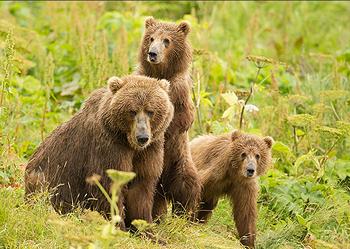
WASHINGTON, DC, July 21, 2017 (ENS) – A wildlife refuge in Alaska will no longer be a real refuge for wildlife after the National Park Service and the U.S. Fish and Wildlife Service obey the latest directives from the Trump administration.
In a pair of July 14, 2017 memos, Virginia Johnson, acting assistant secretary for fish and wildlife and parks, orders the acting directors of the National Park Service and the Fish and Wildlife Service, “to initiate a rulemaking process to reconsider” their agency rules.

Johnson orders that the agencies reconsider the removal of “various prohibitions that directly contradict State of Alaska authorizations and wildlife management decisions, thereby potentially reducing opportunities for sport hunting and commercial trapping on National Park Service lands.”
These prohibitions were set in November 2015 during the Obama administration.
They limit hunting techniques allowed under Alaska State law, such as: taking any black bear, including cubs and sows with cubs, with artificial light at den sites; taking brown bears and black bears over bait; taking wolves and coyotes during the denning season; harvest of swimming caribou or taking caribou from a motorboat while under power; and using dogs to hunt black bears.
Public Employees for Environmental Responsibility, PEER, an association of employees in natural resources agencies, says
the basic conflict is that Alaska encourages killing of predators to increase the supply of game animals, but the federal agencies are charged with protecting all native wildlife, predators included.
PEER points out that traditional federal-state cooperation in wildlife management has broken down in recent years and has been replaced with lawsuits from the state and political acrimony.
Rick Steiner, a retired University of Alaska professor and PEER board member, said, “Alaska’s national parks and wildlife refuges are required by federal law to be managed not as private game reserves but to protect natural diversity, including natural predator-prey dynamics.
Steiner says that lethal control of predators on park boundaries “are devastating in-park wolf populations.”
“The State of Alaska’s unethical predator control practices have no place in modern society, and certainly not on Alaska’s magnificent national parks and refuges,” he said.
Alaska’s legal framework for managing wildlife is based on sustained yield, which is defined by state law to mean “the achievement and maintenance in perpetuity of the ability to support a high level of human harvest of game.”

Now, the Park Service will start a lengthy rulemaking process which will take years. Meanwhile the 2015 rules remain in effect.
“Team Trump says they do not want to give away federal lands but are apparently open to having them mismanaged,” said PEER Executive Director Jeff Ruch, noting that the rules do not apply to subsistence hunting or restrict the taking of wildlife for public safety purposes or defense of property.
“Like most Trump initiatives, this one is ill-considered and likely ineffective but guaranteed to waste a lot of time,” said Ruch.
Ruch, an attorney, points out that the factors cited by Johnson “are political in nature and not a legitimate basis for regulation.”
The National Park Service must abide by legal mandates that a Trump White House cannot remove. So, even if a new rule is promulgated before Trump leaves office, it will almost certainly be challenged in court.
The path for the refuge rules is “even murkier,” says Ruch, and may involve Congressional action.
Copyright Environment News Service (ENS) 2017. All rights reserved.
© 2017, Environment News Service. All rights reserved. Content may be quoted only with proper attribution and a direct link to the original article. Full reproduction is prohibited.
